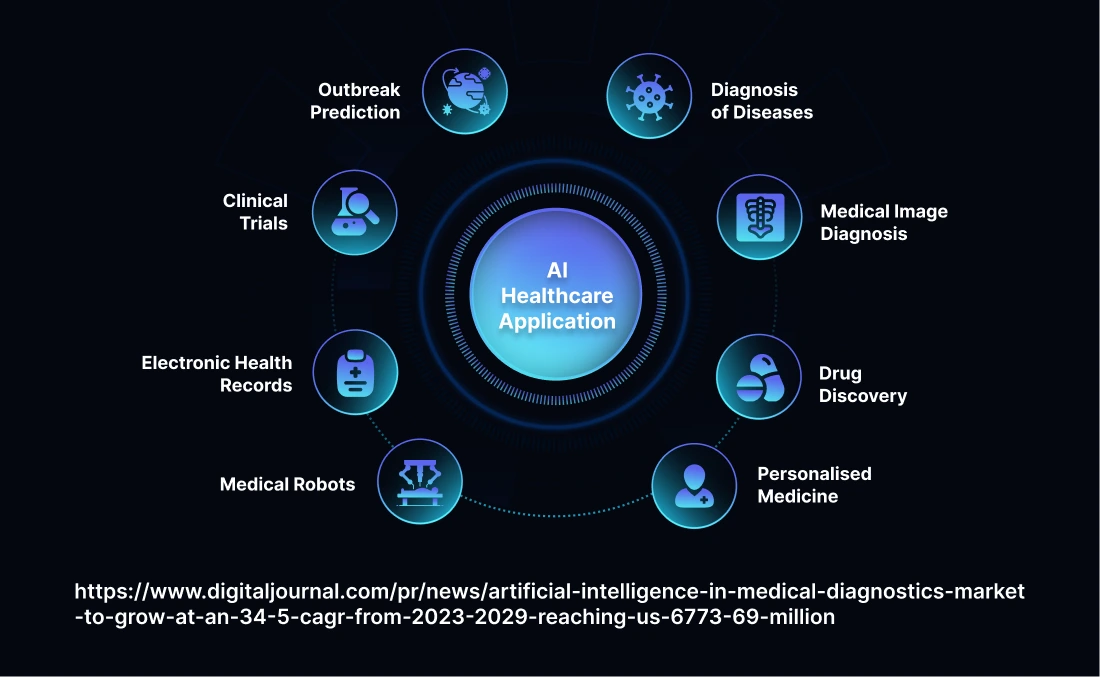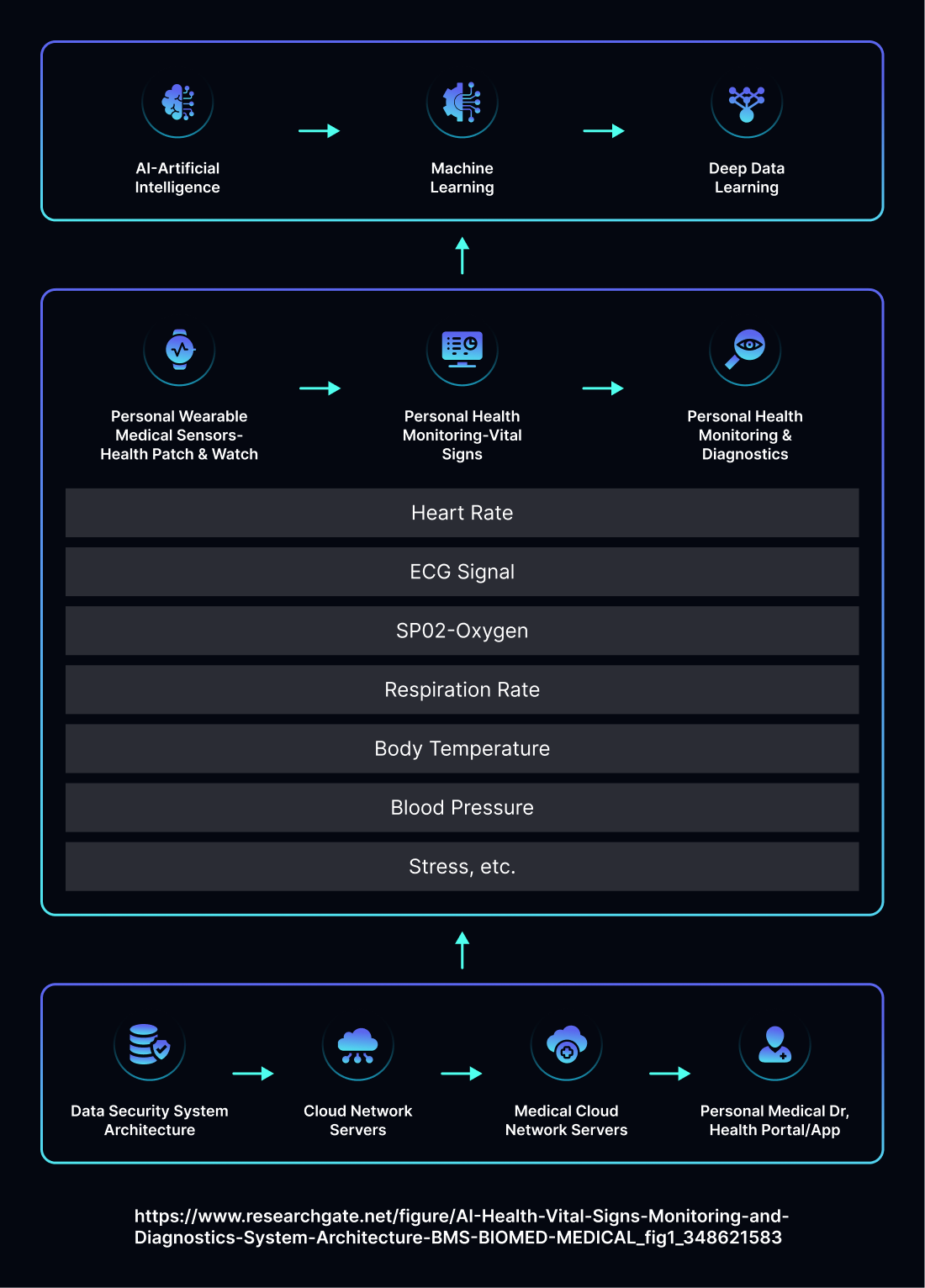The widespread adoption of artificial intelligence technologies across many industries reflects a common belief in the effectiveness of algorithm-based solutions. Leading healthcare providers quickly recognized the importance of tools capable of automatically producing an AI medical diagnosis. Despite some doubts regarding the trustworthiness of AI-based models and regulatory compliance, the usage of AI in clinical care is predicted to increase soon.
Instead of processing large volumes of patient data manually, healthcare professionals now leverage the power of AI to gain valuable insights. Hospitals and other organizations embrace AI and create infrastructure to deploy this technology to increase the quality of their services and improve patient outcomes.
What is an AI Medical Diagnosis?
Accurately determining a patient’s health issue is the key challenge healthcare specialists across the globe face. By some estimates, 5% of people in the US are misdiagnosed, which results in delayed treatment and adverse effects on their physical well-being.
In medical care, AI is utilized to process data using machine learning (ML) and natural language processing (NLP) and provide recommendations regarding treatment.
AI tools are trained to recognize medical anomalies, interpret clinical reports, discover drugs, and assist clients at every stage of a patient’s journey. Getting an accurate diagnosis early allows an individual to raise their chances for recovery and get personalized support.
AI solutions improve the quality of outpatient care and discover crucial details a trained specialist may fail to notice due to fatigue. Integrating AI models with legacy systems adds an extra layer of protection and minimizes the risk of errors. The importance of AI in healthcare diagnostics is hard to underestimate, as such tools are deployed across various fields, including the following ones:
- Pathology;
- Ophthalmology;
- Cardiology;
- Neurology;
- Dermatology.
Capable of analyzing past cases and identifying trends, AI-powered diagnostic tools enhance their ability to spot potentially harmful conditions. Even though AI algorithms are less prone to making mistakes, adding a human to the loop ensures that patients will get high-quality care.
AI cannot fully replace trained medical personnel, as they are prone to biases. When utilized as complementary tools, they help doctors and nurses to optimize workflows and reduce manual workload. Nevertheless, critics voice legitimate concerns about the ethical side of deploying AI, privacy issues, and the quality of datasets utilized during training.
Despite some doubts, there are many reasons to adopt AI services in healthcare. Below, we have outlined their main benefits:
- Quick diagnosis;
- Streamlined data processing;
- Earlier treatment;
- Affordable care;
- Improved outcomes.
Using AI to get suggestions and recommendations, healthcare professionals get access to extensive knowledge bases and achieve better results.
How to Use AI to Improve a Medical Diagnosis?

Leveraging the power of AI and ML models, experts can accurately interpret medical data and deploy complex algorithms to recognize anomalies, manage clinical records, and provide top-level virtual assistance. Achieving positive outcomes requires expediting diagnostics and eliminating the possibility of mistakes.
Personalized medicine becomes possible only through reducing workload and ensuring that healthcare specialists won’t need to spend a lot of time on manual tasks.
There are several ways to deploy AI solutions to improve public health:
- Clinical decision assistance: AI-powered systems analyze all sorts of data helping medical specialists to make fact-based decisions. It makes them more effective than the Modified Early Warning Score (MEWS) and other tools aggregating physiological data to determine short-term developments.
- Imaging: AI-powered software detects anomalies in CT scans, allowing radiologists to make fact-based decisions and quickly analyze large amounts of data. As over 3.6 billion imaging tasks are performed every year, handling the output data may be daunting. However, with the help of ML algorithms, professionals analyze, label, and organize information.
- Enhanced safety: By reducing the possibility of errors, AI-driven tools expedite drug delivery, organize patient data, and detect issues that lead to worse outcomes. Early detection of developments that may endanger a patient allows professionals to change a treatment plan.
After the deployment, AI models require close monitoring and continuous improvement. As the usage of AI in medicine is on the increase, leveraging dedicated algorithm-based software is the most efficient way to provide care of better quality.
Tips and Reminders

Traditional approaches involve time-consuming tests, manual assessments, and appointments. In contrast, an AI medical diagnosis doesn’t take much time. Employing dedicated programs, medical professionals analyze scans and records to discover abnormalities and expedite diagnostics. Even though AI software is invaluable for critical care, progress monitoring, and vital signs tracking, it is not recommended to utilize it without human supervision.
For instance, using LLM chatbots to assist a client on their journey brings tangible benefits. However, organizations should take extra precautions to ensure their seamless functioning. Follow these steps to avoid common issues:
- Customize models: Chatbots should be trained properly to provide top-quality AI assistance.
- Rely on high-quality information: Utilize large datasets to avoid misinforming patients.
- Hire professionals to improve AI tools: Utilizing such systems under the supervision of experts is a must in high-risk areas.
Avoiding AI hallucinations is possible if a chatbot strictly follows instructions and undergoes thorough training.
Providing accurate analysis of medical scans, diagnosing skin conditions, and streamlining drug discovery, AI systems have many uses. Leveraging them to expedite diagnostics and provide patients with more affordable care of higher quality, organizations can achieve shorter treatment duration.
Organizations should employ AI tools to improve the accessibility of healthcare services, ensure timely interventions, and reduce the number of hospitalizations.
Choose a Reliable Software Provider
The deployment of AI in medical care opens many opportunities and facilitates decision-making in a clinical setting. Nevertheless, integrating AI tools with legacy systems may be challenging without the help of experienced professionals.
Using dedicated software to generate an AI medical diagnosis allows healthcare organizations to save time and improve patients’ outcomes without significant investments in infrastructure. MetaDialog has a team of top-level developers who can build an LLM chatbot from scratch and develop an infrastructure using complex technologies in accordance with clients’ requirements. Get in touch with our experts now and improve the quality of healthcare services at your organization!
